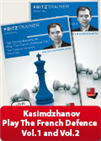Underdogs
Since Russia’s hegemony in Chess Olympiads came to an end in 2002, the squad that won the open section most times is not China nor the United States (if we only count the in-person events) — with three victories, in 2006, 2008 and 2012, it is Armenia who holds that record. Now, with three rounds to go in Chennai, the Caucasians are leading the standings after having faced the two top seeds on consecutive days.
Moreover, they are doing so without local hero Levon Aronian, who transferred to the United States last year — much like Vladimir Akopian. Armenia is the 12th seeded team in Chennai, and one of two squads that have yet to lose a match in the event (with Uzbekistan).
It must be noted that the leaders did get a bit of luck in the seventh round, when Sam Shankland had to resign a drawn position against Robert Hovhannisyan after losing his concentration for a split second.
Team leader Gabriel Sargissian delivered when it mattered most, as he defeated Fabiano Caruana and (now) Pentala Harikrishna after picking up four draws and a loss in previous rounds. Saturday’s victory over ‘Hari’ required plenty of resilience, as he reached the following endgame with two bishops against a bishop and a knight on move 48, and only saw his opponent throw in the towel on move 102.
Material is equal, but White can safely push for a win with his long-range minor pieces and more active monarch. The Indian’s decisive mistake only came on move 96.
Draws on the remaining boards gave Armenia the all-important 2½-1½ victory. The Armenians have stuck to the same lineup since round 4, with Sargissian playing alongside Hrant Melkumyan, Samvel Ter-Sahakyan and top scorer Hovhannisyan.

The Armenian team, with captain Arman Pashikian standing | Photo: Stev Bonhage
Armenia v India
Select an entry from the list to switch between games
India 2 beats the US as there is no stopping Gukesh!
 In this two-volume video course former world-champion and startrainer Rustam Kasimdzhanov shows you the ins and outs of this hugely complex opening.
In this two-volume video course former world-champion and startrainer Rustam Kasimdzhanov shows you the ins and outs of this hugely complex opening.Many of the previews to the Olympiad focused on two teams: on one side, the heavy rating favourites from the United States and, on the other, the incredibly young second squad from India. The two protagonists faced each other in round 8, and it was the local team which prevailed convincingly.
The performance of each team’s top board serves as a good illustration of how the tournament has been going for them. While Fabiano Caruana, the second-highest rated player in Chennai (behind Magnus Carlsen), has been struggling throughout, Dommaraju Gukesh has completely stolen the show in his hometown.
After his win over Cuba’s Carlos Albornoz on Friday, Gukesh had already “pulled a Caruana”, as he had equalled the US grandmaster’s incredible feat of winning seven games in a row from the 2014 Sinquefield Cup. Conveniently for the spectacle, the 16-year-old was paired up against Caruana himself, in a match that was crucial for the US team.
And the youngster delivered once again, as he took down the former World Championship challenger with the black pieces. Caruana, as he has done previously during the tournament, tried to grab the initiative with the white pieces the first time he got a chance. A confident Gukesh responded in kind, pushing his kingside pawns early on and then outplaying his famed opponent in a complex middlegame.
The youngster even ended the game with a flourish!
Caruana resigned after 45.Qxe4, as Black’s rook and bishops are perfectly coordinated to checkmate the white king.
Comparisons have already been made with Vladimir Kramnik’s debut at the 1992 Olympiad, when he scored 8½/9 points for a 2958 performance while still a FIDE Master — the man from Tuapse turned 17 years old on the day the tournament ended in Manila!
 This DVD allows you to learn from the example of one of the best players in the history of chess and from the explanations of the authors (Pelletier, Marin, Müller and Reeh) how to successfully organise your games strategically, consequently how to keep y
This DVD allows you to learn from the example of one of the best players in the history of chess and from the explanations of the authors (Pelletier, Marin, Müller and Reeh) how to successfully organise your games strategically, consequently how to keep yThree years ago, before the first training camp in which Kramnik coached six Indian rising starts — including Gukesh — ChessBase’s co-founder Frederic Friedel talked to the former world champion, and the following exchange was recorded by Sagar Shah:
“Sounds interesting”, said Kramnik, “but who are these talents? How old are they?“ Frederic told him that they would range between 13 and 15 years. “And will I be able to pronounce their names?” Vladimir knew exactly whom Frederic was referring to.
“I have one standing next to me”, Frederic said. “Gukesh, 12 years old. Like to play a few blitz games against him on PlayChess, check out his talent?”
“No”, said Vladimir, “I know his games very well — and I hate losing in blitz! This boy is going to be in the top ten in five years from now — and World Champion in eight”.
If the 16-year-old prodigy continues to improve as quickly as he has been improving lately, Kramnik’s first prediction might be seen as rather conservative in hindsight — with his eight wins in Chennai, Gukesh has already climbed to the 20th spot in the live ratings list!

Gukesh outplayed Fabiano Caruana | Photo: Lennart Ootes
Certainly Gukesh has stolen the spotlight in this year’s Olympiad, but the fact that his team is currently in shared second place, a point behind the leaders, also has to do with the excellent job done by his teammates. Nihal Sarin is undefeated with a 5½/7 score; Praggnanandhaa has collected 4/6 points; Adhiban Baskaran is on 3½/5; and Raunak Sadhwani has grabbed 4½ points in 6 games.
On Saturday, Raunak defeated Leiner Dominguez on board 4. The Cuban-born grandmaster has been the US’s top performer in Chennai. Raunak played what Vishy Anand called “the move of the day” in a chat with Albert Silver.
Dominguez’s 20...a4 was a blunder, since it allowed the spectacular 21.Nbd4. Raunak needed 20 minutes to find this move, and then blitzed out a series of only moves which justify the knight sacrifice — 21...exd4 22.Bxd4 Rg8 23.Rdg1 Nf8 24.Bxf6 Bxf6 25.Rh5+ Nh7 26.e5
The idea behind the whole concept! In the first diagrammed position, White intuitively looked for ways to exploit the black king’s weakness on the h-file, and now, by pushing his e-pawn, he opened up the light-squared diagonal which was initially blocked by the e4-pawn.
A great calculator and Sicilian-Defence specialist, Dominguez went on to find the most trying defensive resources in the ensuing middlegame. At some point, it looked as though the US grandmaster was on his way to saving the draw.
However, a blunder on move 40 again left the 16-year-old Indian — yes, they are all that young! — in the driver’s seat. Dominguez resigned shortly after.

Nihal Sarin | Photo: Stev Bonhage
India 2 v United States
Uzbekistan in shared second place
One point behind the leaders, sharing second place with India 2, is not Azerbaijan (led by Shakhriyar Mamedyarov) nor Poland (led by Jan-Krzysztof Duda) but Uzbekistan, another youthful team that might as well end up shocking the chess world by winning this year’s sui generis Olympiad.
 Considered a master of prophylaxis, Petrosian sensed dangers long before they actually became acute on the board. In his prime, Petrosian was almost invincible. Let our authors introduce you into the world of Tigran Petrosian.
Considered a master of prophylaxis, Petrosian sensed dangers long before they actually became acute on the board. In his prime, Petrosian was almost invincible. Let our authors introduce you into the world of Tigran Petrosian.Leading the team are Nodirbek Abdusattorov (aged 17) and Nodirbek Yakubboev (20). The Uzbek rising stars not only share their first name, but so far have also obtained the exact same score in Chennai — an impressive 6½ out of 8.
The Nodirbeks are joined by Javokhir Sindarov (16), Jakhongir Vakhidov (27) and Shamsiddin Vokhidov (20). In round 8, they beat Germany thanks to a victory by Yakubboev over European champion Matthias Bluebaum on board 2.
In Sunday’s round 9, Uzkekistan faces Armenia in what might end up being a turning point in the fight for first place!
Credit should be given to talent scout Thorsten Cmiel, who warned us about the potential of both India 2 and Uzbekistan in his tournament preview.

Nodirbek Abdusattorov | Photo: Stev Bonhage
Uzbekistan v Germany
Women’s: Ukraine draws India, Georgia in sole second place
The results on the top boards at the women’s event have gone more ‘according to plan’, as the four top seeds are currently standing on the top four spots of the tournament standings.
India, the pre-tournament favourite, remains in the sole lead after conceding its first draw of the event. Not surprisingly, it was Ukraine (the second-seeded squad) which managed to achieve this result, as all four games finished drawn in the marquee matchup of round 8.

Ukraine’s Anna Muzychuk | Photo: Lennart Ootes
This draw allowed Georgia, the third seeds, to close the gap to India, as they obtained a convincing 3-1 victory over Armenia.
Georgia’s Nino Batsiashvili beat Lilit Mkrtchian with black after the latter erred by playing cautiously in a complex tactical position.
Here, the engines give White a clear advantage after the bold 45.gxf6, as she should not fear neither 45...Rxe4 (which would be responded by 46.Qf3) nor 45...Nxe4 (when 46.gxf7 is the strong refutation). As it turns out, the black king’s weakness and the fact that the black queen is sitting on the same file as the monarch are the crucial factors here.
Instead, Mkrtchian went for 45.Rg4, defending e4, which turned the tables in favour of her Georgian opponent. Batsiashvili needed a bit under four minutes to figure out that 45...Rxe4 is winning for Black, as the game continued with 46.Rxe4 Nxe4 (see diagram below), when grabbing with the queen fails to 46...Rh4
By this point, Mkrtchian surely realized she was in trouble, as she tried to limit the damage with 47.Qxd3. It was too late for the Armenian, though, as Batsiashvili swiftly simplified the position into a winning queen endgame and went on to score the full point.

Lilit Mkrtchian and Nino Batsiashvili share smiles right before their hard-fought encounter | Photo: Lennart Ootes
Five teams stand a point behind Georgia, including Kazakhstan (10th seeds), Bulgaria (15th) and Mongolia (28th). The Mongolians, who have impressed throughout the event, defeated Hungary in round 8, with wins by Turmunkh Munkhzul and Bat-Erdene Mungunzul.
India v Ukraine / Georgia v Armenia / Mongolia v Hungary
Round 9 pairings - Open
 This video course is aimed as a tactical guide for Black, featuring the most typical combinations for the French structures.
This video course is aimed as a tactical guide for Black, featuring the most typical combinations for the French structures.
| 1 |
11 |
|
IND2 |
India 2 *) |
25½ |
14 |
|
: |
|
13 |
22 |
Azerbaijan |
AZE |
|
6 |
| 2 |
14 |
|
UZB |
Uzbekistan |
25½ |
14 |
|
: |
|
15 |
22 |
Armenia |
ARM |
|
12 |
| 3 |
7 |
|
NED |
Netherlands |
23½ |
13 |
|
: |
|
13 |
22 |
Iran |
IRI |
|
13 |
| 4 |
25 |
|
GRE |
Greece |
22 |
12 |
|
: |
|
12 |
19 |
United States |
USA |
|
1 |
| 5 |
2 |
|
IND |
India |
21½ |
12 |
|
: |
|
12 |
21 |
Brazil |
BRA |
|
28 |
| 6 |
35 |
|
LTU |
Lithuania |
20 |
12 |
|
: |
|
12 |
20½ |
Germany |
GER |
|
9 |
| 7 |
21 |
|
TUR |
Turkey |
23 |
12 |
|
: |
|
12 |
19 |
Peru |
PER |
|
37 |
| 8 |
40 |
|
KAZ |
Kazakhstan |
21½ |
12 |
|
: |
|
12 |
20 |
Serbia |
SRB |
|
23 |
| 9 |
27 |
|
DEN |
Denmark |
22½ |
11 |
|
: |
|
11 |
21½ |
Spain |
ESP |
|
4 |
| 10 |
29 |
|
AUS |
Australia |
20½ |
11 |
|
: |
|
11 |
21½ |
Ukraine |
UKR |
|
8 |
| 11 |
30 |
|
ARG |
Argentina |
23 |
11 |
|
: |
|
11 |
20½ |
England |
ENG |
|
10 |
| 12 |
15 |
|
FRA |
France |
21½ |
11 |
|
: |
|
11 |
20 |
Cuba |
CUB |
|
32 |
| 13 |
18 |
|
CZE |
Czech Republic |
22½ |
11 |
|
: |
|
11 |
20½ |
Chile |
CHI |
|
42 |
| 14 |
19 |
|
HUN |
Hungary |
21 |
11 |
|
: |
|
11 |
20½ |
Slovenia |
SLO |
|
41 |
| 15 |
20 |
|
ROU |
Romania |
21 |
11 |
|
: |
|
11 |
20½ |
Moldova |
MDA |
|
48 |
...96 boards
Round 9 pairings - Women
| 1 |
4 |
|
POL |
Poland |
24½ |
13 |
|
: |
|
15 |
23 |
India *) |
IND |
|
1 |
| 2 |
2 |
|
UKR |
Ukraine |
23 |
13 |
|
: |
|
14 |
22 |
Georgia |
GEO |
|
3 |
| 3 |
15 |
|
BUL |
Bulgaria |
23½ |
13 |
|
: |
|
13 |
22 |
Kazakhstan |
KAZ |
|
10 |
| 4 |
6 |
|
AZE |
Azerbaijan |
22 |
12 |
|
: |
|
13 |
22½ |
Mongolia |
MGL |
|
28 |
| 5 |
8 |
|
GER |
Germany |
21½ |
12 |
|
: |
|
12 |
20 |
England |
ENG |
|
21 |
| 6 |
9 |
|
ARM |
Armenia |
23 |
12 |
|
: |
|
12 |
20 |
Romania |
ROU |
|
20 |
| 7 |
32 |
|
INA |
Indonesia |
23½ |
12 |
|
: |
|
12 |
23½ |
Spain |
ESP |
|
13 |
| 8 |
34 |
|
SWE |
Sweden |
22 |
12 |
|
: |
|
12 |
19½ |
Netherlands |
NED |
|
17 |
| 9 |
22 |
|
SVK |
Slovakia |
17½ |
11 |
|
: |
|
11 |
20½ |
France |
FRA |
|
5 |
| 10 |
27 |
|
GRE |
Greece |
21½ |
11 |
|
: |
|
11 |
22 |
United States |
USA |
|
7 |
| 11 |
11 |
|
IND2 |
India 2 |
21 |
11 |
|
: |
|
11 |
20 |
Switzerland |
SUI |
|
29 |
| 12 |
23 |
|
CZE |
Czech Republic |
19½ |
11 |
|
: |
|
11 |
19½ |
Cuba |
CUB |
|
14 |
| 13 |
30 |
|
EST |
Estonia |
20 |
11 |
|
: |
|
11 |
19½ |
India 3 |
IND3 |
|
16 |
| 14 |
12 |
|
HUN |
Hungary |
20 |
10 |
|
: |
|
11 |
21 |
Philippines |
PHI |
|
39 |
| 15 |
45 |
|
FIN |
Finland |
18 |
10 |
|
: |
|
10 |
18½ |
Serbia |
SRB |
|
18 |
...78 boards
*) This team is assigned to a fixed board.
Links
























